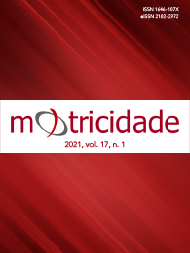Influence of systematized contents of physical education on motor coordination of children in early childhood
DOI:
https://doi.org/10.6063/motricidade.20098Abstract
Motor practices should provide children the acquisition of mature patterns of fundamental skills, but currently scholar Physical Education does not appear to offer sufficient stimulation. The objective of the study was to evaluate the effect of systematized classes in preschool children's motor coordination. The coordinative level of 84 children aged four to five years was evaluated through the battery of tests KTK, before and after two distinct programs of motor practices, namely the regular Physical Education classes given by non-specialist physical education teachers (CG) and intervention based on a developmental approach (EG). We compared the scores of the KTK tests between groups for each moment; between pre- and post-tests for each group; we analyzed the effect sizes for; and run subsequent analysis stratified by sex and by age. Both groups have improved the scores in all tasks. In the post-test, EG achieved statistically higher scores in comparison to CG for only one task of KTK, but it achieved higher effect sizes in all tasks. The stratified results did differ relatively to the effect of the interventions regarding the sexes, but indicated that younger children might be particularly sensitive to those interventions. We discuss the relevance of systematized contents with organization, variability, progressive difficulty, and suitability to age range for an adequate development of motor coordination in preschoolers.
Downloads
Published
Issue
Section
License
The authors of submitted manuscripts must transfer the full copyright to Journal Motricidade / Sílabas Didáticas Editions. Granting copyright permission allows the publication and dissemination of the article in printed or electronic formats, and copyrights start at the moment the manuscript is accepted for publication. It also allows Journal Motricidade to use and commercialise the article in terms of licensing, lending or selling its content to indexation/abstracts databases and other entities.
According to the terms of the Creative Commons licence, authors may reproduce a reasonable number of copies for personal or professional purposes, but without any economic gain. SHERPA/RoMEO allows authors to post a final digital copy (post-printing version) of the article on their websites or on their institutions' scientific repository.


